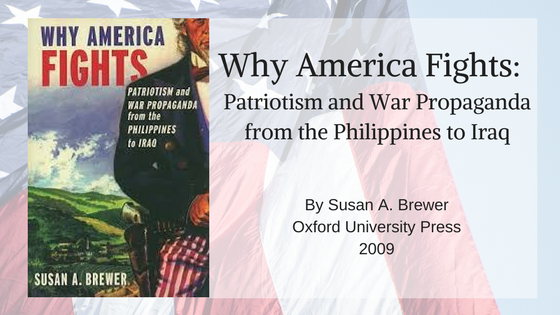
We’re kicking off First Friday Favorites with a book I read recently for a seminar course. Why America Fights was such a fascinating read for me. Even though most of the book is focused on conflicts outside of my area of interest, I still found the discussion that Brewer provides about propaganda throughout those other wars to be pertinent to more recent conflicts. Brewer uses the War in the Philippines, WWI, WWII, the Korean War, the Vietnam War, and the War in Iraq to study how the American government has manipulated its citizens in the pursuit of war. She highlights how public consent for war has been achieved (or perhaps coerced) through propaganda, slogans, deception, and public relations campaigns, among other things. As readers, we are challenged to heed the warning that “officials in recent decades have turned to more misleading manipulation to preserve their freedom of action” (283).
Personally, I learned a lot from this book. Brewer provides sufficient background for each conflict to make the discussion of propaganda fruitful. Even if you’re not steeped in the historical context of any of the wars featuresd in this book, I think you will still be able to follow along with Brewer’s discussion and probably learn a lot about how the American government has dealt publicly with going to war. I haven’t read much about the War in the Philippines, WWI, or the Korean War, but I was able to followerBrewer’s arguments and connect some similarities and patterns to the conflicts that I am familiar with.
The ease with which I could read this book is perhaps what I liked most. The argument made sense to me, the evidence seemed sound, I was able to draw my own connections to other wars and current events, and the writing was quite good. While this book was published in 2009, it certainly resonates in today’s political environment. The overwhelming efforts to make something look good rather than be good is something an informed citizenry needs to be aware of. I also think it is important for the citizens of a country to be able to see through a government’s attempts to manipulate and coerce. In addition, I was reminded how often propaganda is used to quell dissent and silence opposition. With Brewer’s book, we may get the chance to “look behind the curtain” and understand the motivations and tactics behind those calls to rally around the flag; maybe we’ll rally a little more cautiously.
Discussions with this book…
1. Where is the line between necessary propaganda and harmful propaganda? Most Americans resisted involvement in WWII, but it is remembered as “The Good War.” Some may say that removing Saddam Hussein from power was the right decision, but is it still “right” when a deceitful campaign was used to garner public support for the war?
2. Is it possible for a society to resist overtly emotional and nationalist sentiments when war is on the horizon? What can be done to ensure that dissent and opposition is heard?